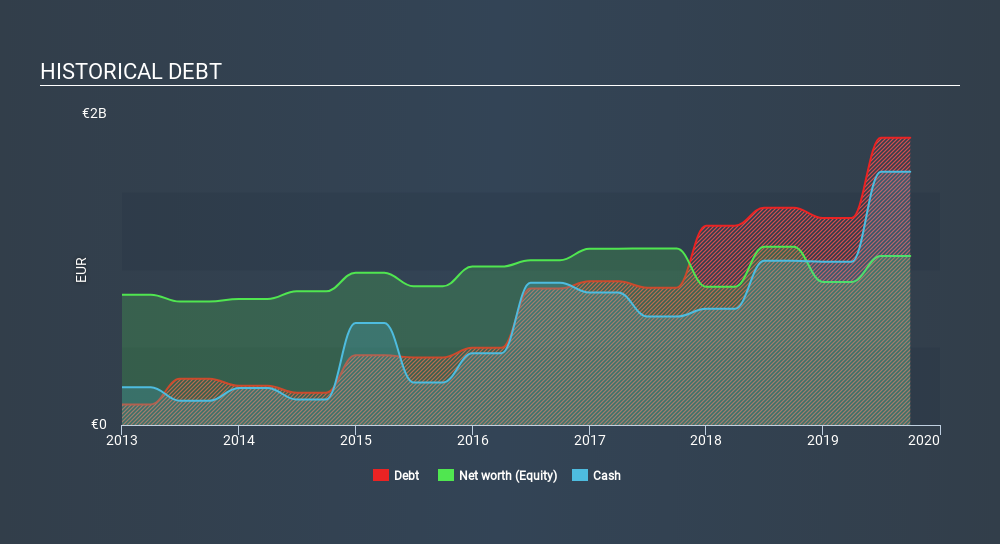Howard Marks put it nicely when he said that, rather than worrying about share price volatility, 'The possibility of permanent loss is the risk I worry about... and every practical investor I know worries about. So it might be obvious that you need to consider debt, when you think about how risky any given stock is, because too much debt can sink a company. We can see that Ubisoft Entertainment SA (EPA:UBI) does use debt in its business. But the more important question is: how much risk is that debt creating?
What Risk Does Debt Bring?
Debt and other liabilities become risky for a business when it cannot easily fulfill those obligations, either with free cash flow or by raising capital at an attractive price. If things get really bad, the lenders can take control of the business. However, a more frequent (but still costly) occurrence is where a company must issue shares at bargain-basement prices, permanently diluting shareholders, just to shore up its balance sheet. Of course, debt can be an important tool in businesses, particularly capital heavy businesses. When we examine debt levels, we first consider both cash and debt levels, together.
View 1 warning sign we detected for Ubisoft Entertainment
How Much Debt Does Ubisoft Entertainment Carry?
The image below, which you can click on for greater detail, shows that at September 2019 Ubisoft Entertainment had debt of €1.85b, up from €1.4k in one year. However, it also had €1.63b in cash, and so its net debt is €219.1m.

A Look At Ubisoft Entertainment's Liabilities
According to the last reported balance sheet, Ubisoft Entertainment had liabilities of €1.64b due within 12 months, and liabilities of €1.29b due beyond 12 months. Offsetting these obligations, it had cash of €1.63b as well as receivables valued at €397.2m due within 12 months. So it has liabilities totalling €897.2m more than its cash and near-term receivables, combined.
Of course, Ubisoft Entertainment has a market capitalization of €7.22b, so these liabilities are probably manageable. But there are sufficient liabilities that we would certainly recommend shareholders continue to monitor the balance sheet, going forward.
In order to size up a company's debt relative to its earnings, we calculate its net debt divided by its earnings before interest, tax, depreciation, and amortization (EBITDA) and its earnings before interest and tax (EBIT) divided by its interest expense (its interest cover). This way, we consider both the absolute quantum of the debt, as well as the interest rates paid on it.
Ubisoft Entertainment has very modest net debt, giving rise to a debt to EBITDA ratio of -21.63. And this impression is enhanced by its strong EBIT which covers interest costs 7.5 times. It is just as well that Ubisoft Entertainment's load is not too heavy, because its EBIT was down 67% over the last year. Falling earnings (if the trend continues) could eventually make even modest debt quite risky. There's no doubt that we learn most about debt from the balance sheet. But it is future earnings, more than anything, that will determine Ubisoft Entertainment's ability to maintain a healthy balance sheet going forward. So if you want to see what the professionals think, you might find this free report on analyst profit forecasts to be interesting.
Finally, a company can only pay off debt with cold hard cash, not accounting profits. So it's worth checking how much of that EBIT is backed by free cash flow. Over the most recent three years, Ubisoft Entertainment recorded free cash flow worth 61% of its EBIT, which is around normal, given free cash flow excludes interest and tax. This cold hard cash means it can reduce its debt when it wants to.
Our View
Ubisoft Entertainment's EBIT growth rate was a real negative on this analysis, although the other factors we considered were considerably better In particular, we are dazzled with its net debt to EBITDA. When we consider all the elements mentioned above, it seems to us that Ubisoft Entertainment is managing its debt quite well. Having said that, the load is sufficiently heavy that we would recommend any shareholders keep a close eye on it. Even though Ubisoft Entertainment lost money on the bottom line, its positive EBIT suggests the business itself has potential. So you might want to check out how earnings have been trending over the last few years.
If, after all that, you're more interested in a fast growing company with a rock-solid balance sheet, then check out our list of net cash growth stocks without delay.
If you spot an error that warrants correction, please contact the editor at editorial-team@simplywallst.com. This article by Simply Wall St is general in nature. It does not constitute a recommendation to buy or sell any stock, and does not take account of your objectives, or your financial situation. Simply Wall St has no position in the stocks mentioned.
We aim to bring you long-term focused research analysis driven by fundamental data. Note that our analysis may not factor in the latest price-sensitive company announcements or qualitative material. Thank you for reading.
About ENXTPA:UBI
Ubisoft Entertainment
Produces, publishes, distributes, and operates video games for consoles, PC, smartphones, and tablets in both physical and digital formats in Europe, North America, and internationally.
Undervalued with reasonable growth potential.
Similar Companies
Market Insights
Weekly Picks

Early mover in a fast growing industry. Likely to experience share price volatility as they scale


A case for CA$31.80 (undiluted), aka 8,616% upside from CA$0.37 (an 86 bagger!).


Moderation and Stabilisation: HOLD: Fair Price based on a 4-year Cycle is $12.08
Recently Updated Narratives

Meta’s Bold Bet on AI Pays Off

ADP Stock: Solid Fundamentals, But AI Investments Test Its Margin Resilience

Visa Stock: The Toll Booth at the Center of Global Commerce
Popular Narratives


Crazy Undervalued 42 Baggers Silver Play (Active & Running Mine)


NVDA: Expanding AI Demand Will Drive Major Data Center Investments Through 2026


The AI Infrastructure Giant Grows Into Its Valuation
Trending Discussion




